冀教版八年级下册Unit 5 Buying and Selling Lesson 26 Cookies, Please!课件(共32张PPT)
文档属性
| 名称 | 冀教版八年级下册Unit 5 Buying and Selling Lesson 26 Cookies, Please!课件(共32张PPT) |

|
|
| 格式 | pptx | ||
| 文件大小 | 515.0KB | ||
| 资源类型 | 教案 | ||
| 版本资源 | 冀教版 | ||
| 科目 | 英语 | ||
| 更新时间 | 2024-05-02 00:00:00 | ||
图片预览


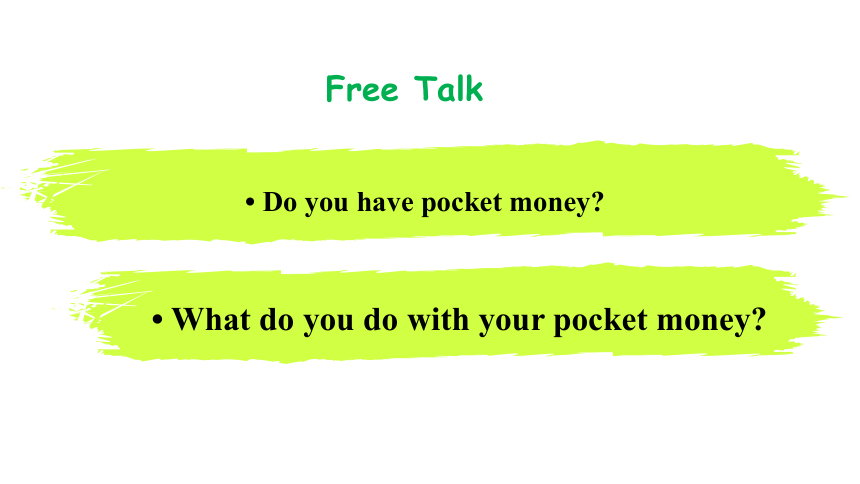
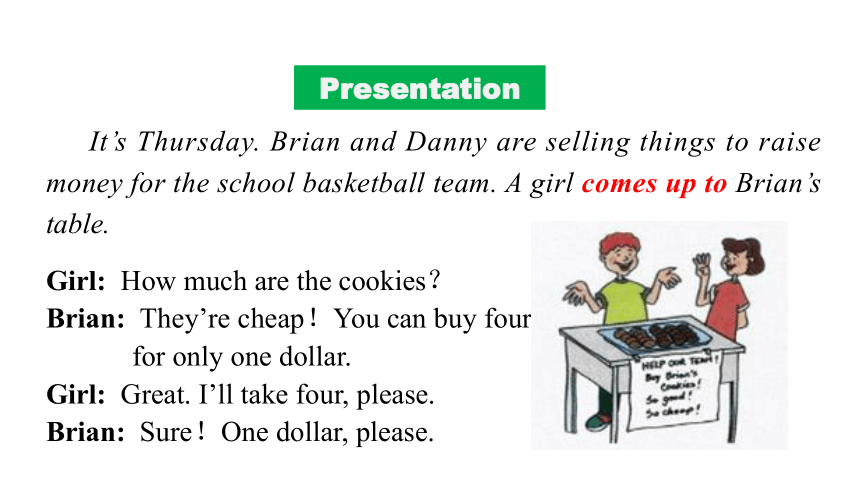
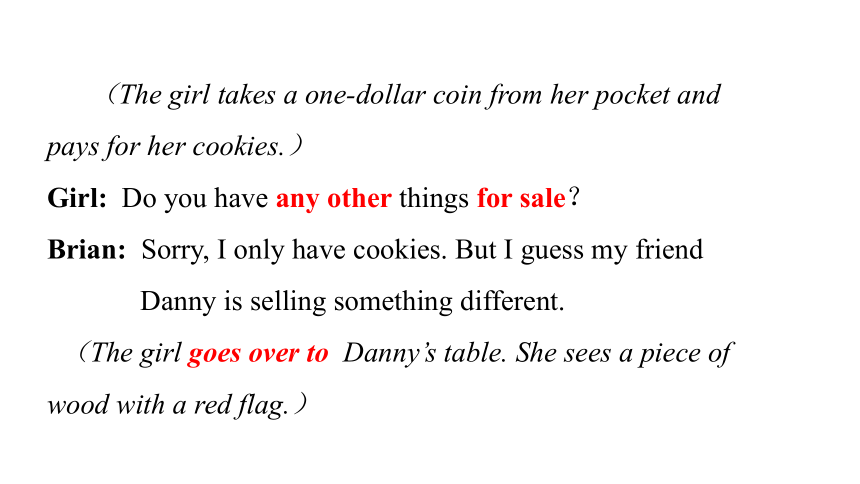
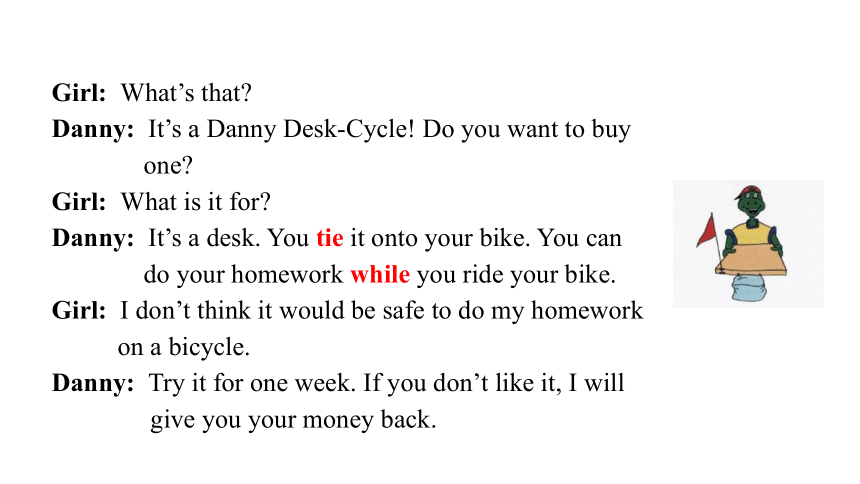
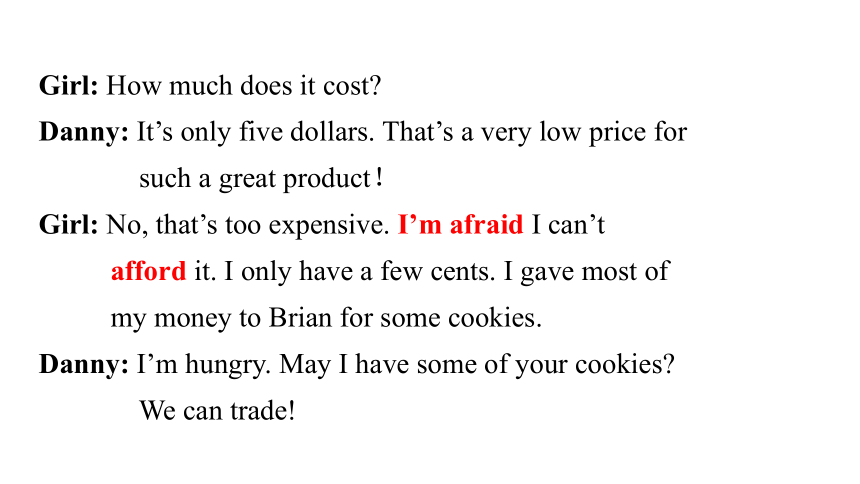
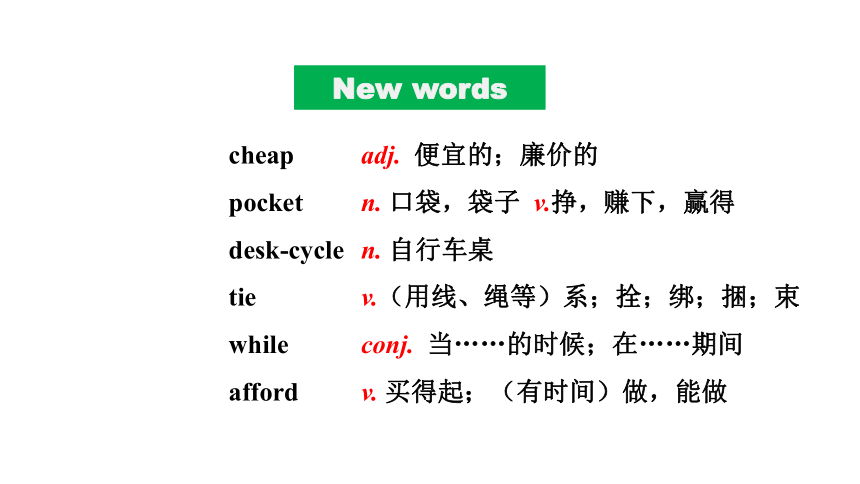
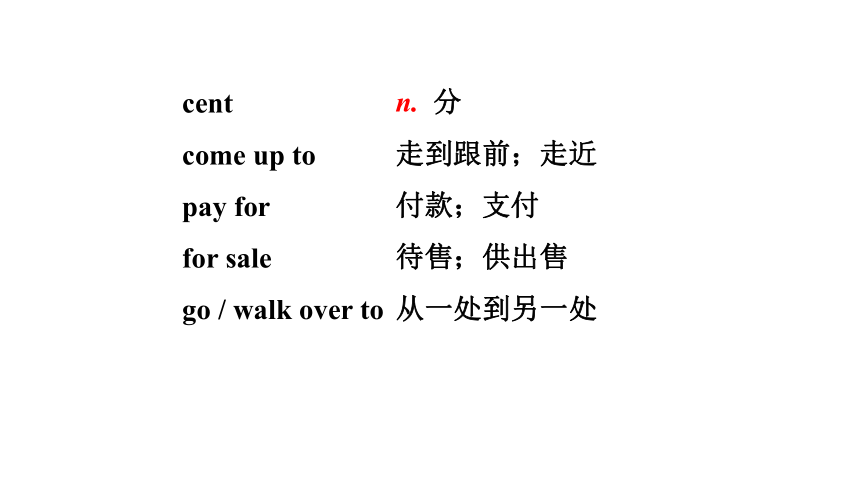
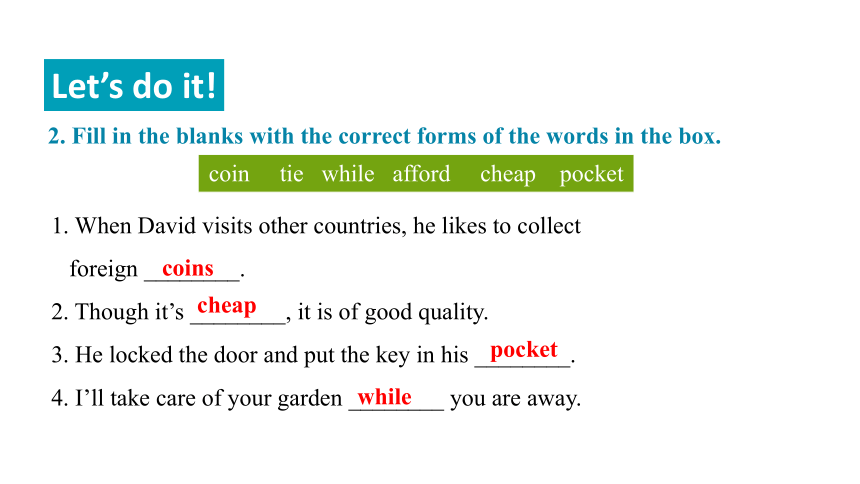
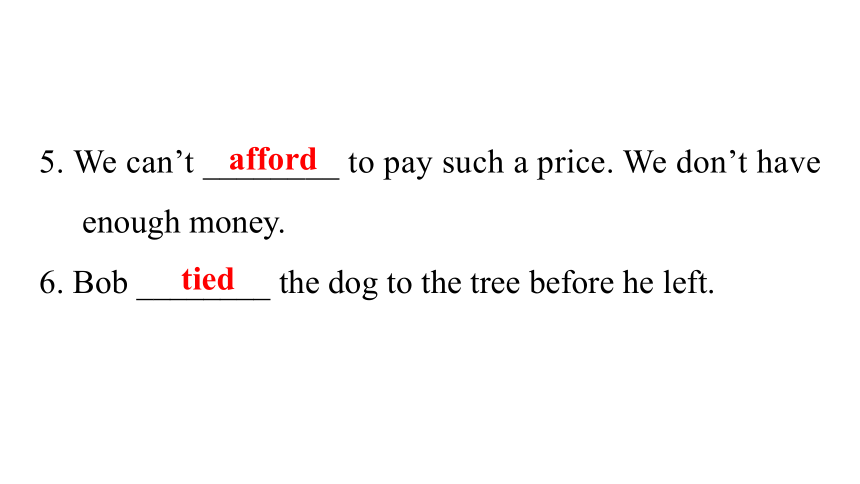
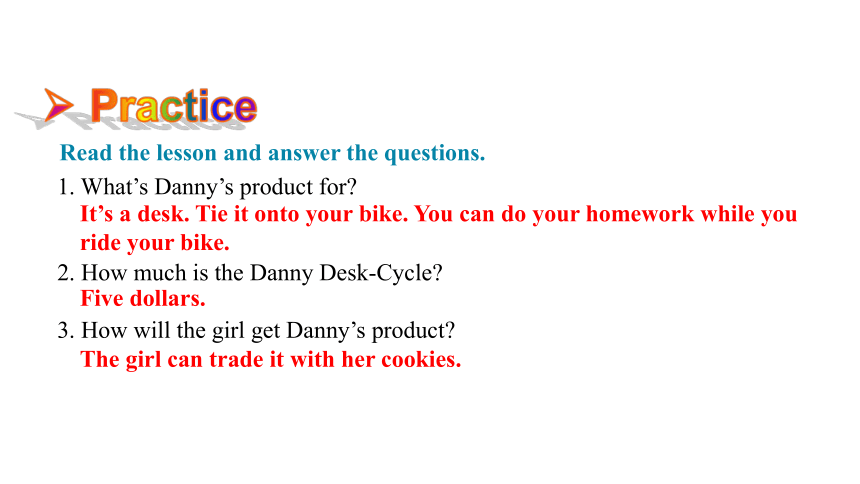
文档简介
(共32张PPT)
Lesson 26: Cookies, Please!
Unit 5 Buying and Selling
单词: cheap; pocket; tie; while; afford; cent
短语: come up to; pay for; for sale; go / walk over to
句子: (1) What is it for
(2) I’m afraid I can’t afford it.
(3) You can do your homework while you ride your bike.
学习并积累一些与日常购物、付款、推销产品等相关的词汇和表达;能掌握并运用英语购物用语,初步了解如何推销产品,学会如何正确处理自己的零花钱,并能用英语进行买卖。
Learning Goals
1
2
Free Talk
Do you have pocket money
What do you do with your pocket money
Presentation
It’s Thursday. Brian and Danny are selling things to raise money for the school basketball team. A girl comes up to Brian’s table.
Girl: How much are the cookies?
Brian: They’re cheap!You can buy four
for only one dollar.
Girl: Great. I’ll take four, please.
Brian: Sure!One dollar, please.
(The girl takes a one dollar coin from her pocket and
pays for her cookies.)
Girl: Do you have any other things for sale?
Brian: Sorry, I only have cookies. But I guess my friend
Danny is selling something different.
(The girl goes over to Danny’s table. She sees a piece of
wood with a red flag.)
Girl: What’s that
Danny: It’s a Danny Desk-Cycle! Do you want to buy
one
Girl: What is it for
Danny: It’s a desk. You tie it onto your bike. You can
do your homework while you ride your bike.
Girl: I don’t think it would be safe to do my homework
on a bicycle.
Danny: Try it for one week. If you don’t like it, I will
give you your money back.
Girl: How much does it cost
Danny: It’s only five dollars. That’s a very low price for
such a great product!
Girl: No, that’s too expensive. I’m afraid I can’t
afford it. I only have a few cents. I gave most of
my money to Brian for some cookies.
Danny: I’m hungry. May I have some of your cookies
We can trade!
New words
cheap
pocket
desk-cycle
tie
while
afford
adj. 便宜的;廉价的
n. 口袋,袋子 v.挣,赚下,赢得
n. 自行车桌
v.(用线、绳等)系;拴;绑;捆;束
conj. 当……的时候;在……期间
v. 买得起;(有时间)做,能做
cent
come up to
pay for
for sale
go / walk over to
n. 分
走到跟前;走近
付款;支付
待售;供出售
从一处到另一处
Let’s do it!
2. Fill in the blanks with the correct forms of the words in the box.
coin tie while afford cheap pocket
1. When David visits other countries, he likes to collect
foreign ________.
2. Though it’s ________, it is of good quality.
3. He locked the door and put the key in his ________.
4. I’ll take care of your garden ________ you are away.
coins
cheap
pocket
while
5. We can’t ________ to pay such a price. We don’t have enough money.
6. Bob ________ the dog to the tree before he left.
afford
tied
Practice
Read the lesson and answer the questions.
1. What’s Danny’s product for
2. How much is the Danny Desk-Cycle
3. How will the girl get Danny’s product
Five dollars.
It’s a desk. Tie it onto your bike. You can do your homework while you ride your bike.
The girl can trade it with her cookies.
1. Read the lesson and write true(T)or false(F).
1. Brian’s cookies are expensive. ( )
2. The girl pays one dollar for four cookies. ( )
3. Danny is selling some wood, bags and red flags. ( )
4. Danny’s invention is for doing homework. ( )
5. The girl will buy the Danny Desk Cycle. ( )
F
F
F
T
T
Let’s do it!
Language points
1. A girl comes up to Brian’s table.
come up to (为攀谈而)走到跟前;走近
本短语中up是副词,to为介词,to后可接表示人、地点或事物的名词。如果不需要说明所接近的对象,也可将to省略。
※ She is coming up to me.
她正朝我走来。
拓展:come up with表示“提出;想出”
※ How soon can you come up with the money
你什么时候能拿出这笔钱?
2. I’ll take four, please. 我买四个。
take此处意为“买”,相当于buy,在口语中很常用,也可以用get来表达。
※ This yellow dress is very beautiful. I’ll buy / take / get it.
这件黄色的连衣裙非常漂亮,我要买它。
3. Do you have any other things for sale 你卖别的东西吗
(1) any other其他的
any other用在肯定句中,后面常接可数名词单数。
※ Mary is taller than other girl in the class.
玛丽比班上其他任何一个女孩都高。
any other用在否定句或疑问句中,后面常接可数名词复数。
※ Do you have any other questions
你还有其他的问题吗?
(2) for sale出售,待售
※ This house is for sale.
这套房子待售。
拓展:on sale廉价出售,上市
※ The style of furniture is not on sale in this shop.
这款家具不在这家店出售。
4. What is it for 它是做什么用的
for表示“(用途,意图,目标,愿望)对,供,适用于……”。此句相当于“What is it used for ”。
※ What is the pen(used)for
笔是用来做什么的
※ It is (used) for writing.
它是用来写字的。
5. You tie it onto your bike.
tie v.(用线、绳等)系;拴;绑
tie作动词时常和介词to / onto连用,构成:
tie sth. to / onto sth.“把……系在……上”。
※ Tie the horse to the tree.
把马拴在树上。
tie还可作名词,意为“绳子;线;领带”。
6. You can do your homework while you ride your bike. 你可以一边骑自行车一边做作业。
while连词,意为“当……的时候,与……同时”,引导时间状语从句。
※ My mother was washing clothes while my father was watching TV.
我爸爸在看电视的时候,我妈妈在洗衣服。
拓展:while还可以作名词,意为“一会儿,一段时间”。
※ Can I rest for a while
我能休息一会儿吗
辨析:when与while
when 接“时间点”,引导的从句的动作可以和主句的动作同时发生,也可以在主句的动作之前或之后发生。 The film had been on for ten minutes when they got to the cinema.
当他们到达电影院时,电影已经开始10 分钟了。
while 接“时间段”,主句的动作与从句的动作同时发生,但持续时间一般较长或主句的动作在从句的动作之中发生。 My brother was learning English while my sister was listening to music. 当我哥哥在学英语的时候,我妹妹在听音乐。
6. That’s a very low price for such a great product. 对这么好的一款产品来说,这个价格很低了。
price名词,意为“价格”,在形容价格高或低时用high或low,而不用expensive或cheap。若表示某物价格昂贵或便宜,则用:
“物+ be + expensive / cheap”或“the price of +物+ be + high / low”。
※ The price of the coat is too high. I can’t afford it.
=The coat is too expensive. I can’t afford it.
这件大衣太贵了,我买不起。
7. I’m afraid I can’t afford it.我恐怕买不起。
(1) I’m afraid ... 我恐怕……
口语中I’m afraid相当于I’m sorry,是一种委婉的言辞,引出一个对方不愿意接受的情况或引出一个歉意的拒绝,意为“恐怕”,其后常接that从句,且that常可省略。
※ I’m afraid (that) I can’t go to your party next week.
我恐怕下周不能参加你的聚会。
afraid常用于以下两个句型中:
※ I’m afraid so.
我恐怕是那样的。
※ I’m afraid not.
我恐怕不是那样的。
(2) afford v. 意为“买得起,(有时间)做,能做”,通常与can / could / be able to连用,多用于否定句或疑问句。
afford to do sth.负担得起做某事
※ We can’t afford to waste a single day.
我们连一天也浪费不起。
afford +名词,意为“负担得起;抽得出”
※ We cannot afford a new car.
我们买不起新车。
3. In the lesson, Danny uses some strategies to push his product. Find Danny’s strategies and write them down.
Danny’s Strategies:
Function of the product:________________________________
________________________________
Try out the product:___________________________________
___________________________________
Attractive price:______________________________________
_______________________________________
You can do your homework on it
while you ride your bike.
Try it for one week. If you don’t like it,
I will give you your money back.
It’s only five dollars. That’s a very low
price for such a great product.
Let’s do it!
Imagine you are going to push a product. What will you say Write some sentences.
Buy one, get one free!
Big Sale!
Delivery Free!
Try before you buy!
Retelling the story
Brian’s basketball team is going to play in _______ city. The trip _____ lots of money. ______ player needs _____ _______ $150. They want to _____ some money for the team. But they don't have any _____. They think they should work together to ______ some money. Jenny wants to have a _____ ______. She thinks they can sell snacks and other things ____ ____ ____. She will also make a ______. Brian will bake _________ _________. He thinks everybody likes cookies. Danny wants to buy _______ cookies.
another
costs
Each
to pay
make
jobs
raise
bake sale
at lunch hour
poster
something delicious
sixteen
4. Work in pairs and make up a dialogue using the information from activity 3.
You can use the following expressions:
How much...?
They’re cheap!
That’s fine. I’ll take..., please.
What is this for?
That’s too expensive. I’m afraid I can’t afford it.
Let’s do it!
Practice
1. I _____ 10 yuan for a pen yesterday.
A. took B. paid C. cost D. spent
2. —_______ will the pens cost
—About 20 yuan.
A. How many B. How much C. What D. Which
3. I was writing a diary _______ my brother was watching TV yesterday
evening.
A. before B. after C. until D. while
4. We can’t afford ________ on vacation this summer.
A. go B. going C. to go D. went
B
B
D
C
I.单项选择。
II.用方框中所给短语的适当形式填空。
1. Do you have _______________things to say
2. How much did you _______________the car
3. Danny is _______________me.
4. This kind of book is _______________.
5. We all _______________ the shop.
any other
pay for
coming up to
for sale
go over to
pay for; for sale; any other; come up to; go over to
Sum up
1. The new words:
cheap; pocket; tie; while; afford; cent
2. Important phrases:
come up to; pay for; for sale; go / walk over to
3. Important sentences:
(1) What is it for
(2) I’m afraid I can’t afford it.
(3) You can do your homework while you ride your bike.
Homework
1. Remember the new words and expressions learnt in this lesson.
2. Preview Lesson 27.
Lesson 26: Cookies, Please!
Unit 5 Buying and Selling
单词: cheap; pocket; tie; while; afford; cent
短语: come up to; pay for; for sale; go / walk over to
句子: (1) What is it for
(2) I’m afraid I can’t afford it.
(3) You can do your homework while you ride your bike.
学习并积累一些与日常购物、付款、推销产品等相关的词汇和表达;能掌握并运用英语购物用语,初步了解如何推销产品,学会如何正确处理自己的零花钱,并能用英语进行买卖。
Learning Goals
1
2
Free Talk
Do you have pocket money
What do you do with your pocket money
Presentation
It’s Thursday. Brian and Danny are selling things to raise money for the school basketball team. A girl comes up to Brian’s table.
Girl: How much are the cookies?
Brian: They’re cheap!You can buy four
for only one dollar.
Girl: Great. I’ll take four, please.
Brian: Sure!One dollar, please.
(The girl takes a one dollar coin from her pocket and
pays for her cookies.)
Girl: Do you have any other things for sale?
Brian: Sorry, I only have cookies. But I guess my friend
Danny is selling something different.
(The girl goes over to Danny’s table. She sees a piece of
wood with a red flag.)
Girl: What’s that
Danny: It’s a Danny Desk-Cycle! Do you want to buy
one
Girl: What is it for
Danny: It’s a desk. You tie it onto your bike. You can
do your homework while you ride your bike.
Girl: I don’t think it would be safe to do my homework
on a bicycle.
Danny: Try it for one week. If you don’t like it, I will
give you your money back.
Girl: How much does it cost
Danny: It’s only five dollars. That’s a very low price for
such a great product!
Girl: No, that’s too expensive. I’m afraid I can’t
afford it. I only have a few cents. I gave most of
my money to Brian for some cookies.
Danny: I’m hungry. May I have some of your cookies
We can trade!
New words
cheap
desk-cycle
tie
while
afford
adj. 便宜的;廉价的
n. 口袋,袋子 v.挣,赚下,赢得
n. 自行车桌
v.(用线、绳等)系;拴;绑;捆;束
conj. 当……的时候;在……期间
v. 买得起;(有时间)做,能做
cent
come up to
pay for
for sale
go / walk over to
n. 分
走到跟前;走近
付款;支付
待售;供出售
从一处到另一处
Let’s do it!
2. Fill in the blanks with the correct forms of the words in the box.
coin tie while afford cheap pocket
1. When David visits other countries, he likes to collect
foreign ________.
2. Though it’s ________, it is of good quality.
3. He locked the door and put the key in his ________.
4. I’ll take care of your garden ________ you are away.
coins
cheap
while
5. We can’t ________ to pay such a price. We don’t have enough money.
6. Bob ________ the dog to the tree before he left.
afford
tied
Practice
Read the lesson and answer the questions.
1. What’s Danny’s product for
2. How much is the Danny Desk-Cycle
3. How will the girl get Danny’s product
Five dollars.
It’s a desk. Tie it onto your bike. You can do your homework while you ride your bike.
The girl can trade it with her cookies.
1. Read the lesson and write true(T)or false(F).
1. Brian’s cookies are expensive. ( )
2. The girl pays one dollar for four cookies. ( )
3. Danny is selling some wood, bags and red flags. ( )
4. Danny’s invention is for doing homework. ( )
5. The girl will buy the Danny Desk Cycle. ( )
F
F
F
T
T
Let’s do it!
Language points
1. A girl comes up to Brian’s table.
come up to (为攀谈而)走到跟前;走近
本短语中up是副词,to为介词,to后可接表示人、地点或事物的名词。如果不需要说明所接近的对象,也可将to省略。
※ She is coming up to me.
她正朝我走来。
拓展:come up with表示“提出;想出”
※ How soon can you come up with the money
你什么时候能拿出这笔钱?
2. I’ll take four, please. 我买四个。
take此处意为“买”,相当于buy,在口语中很常用,也可以用get来表达。
※ This yellow dress is very beautiful. I’ll buy / take / get it.
这件黄色的连衣裙非常漂亮,我要买它。
3. Do you have any other things for sale 你卖别的东西吗
(1) any other其他的
any other用在肯定句中,后面常接可数名词单数。
※ Mary is taller than other girl in the class.
玛丽比班上其他任何一个女孩都高。
any other用在否定句或疑问句中,后面常接可数名词复数。
※ Do you have any other questions
你还有其他的问题吗?
(2) for sale出售,待售
※ This house is for sale.
这套房子待售。
拓展:on sale廉价出售,上市
※ The style of furniture is not on sale in this shop.
这款家具不在这家店出售。
4. What is it for 它是做什么用的
for表示“(用途,意图,目标,愿望)对,供,适用于……”。此句相当于“What is it used for ”。
※ What is the pen(used)for
笔是用来做什么的
※ It is (used) for writing.
它是用来写字的。
5. You tie it onto your bike.
tie v.(用线、绳等)系;拴;绑
tie作动词时常和介词to / onto连用,构成:
tie sth. to / onto sth.“把……系在……上”。
※ Tie the horse to the tree.
把马拴在树上。
tie还可作名词,意为“绳子;线;领带”。
6. You can do your homework while you ride your bike. 你可以一边骑自行车一边做作业。
while连词,意为“当……的时候,与……同时”,引导时间状语从句。
※ My mother was washing clothes while my father was watching TV.
我爸爸在看电视的时候,我妈妈在洗衣服。
拓展:while还可以作名词,意为“一会儿,一段时间”。
※ Can I rest for a while
我能休息一会儿吗
辨析:when与while
when 接“时间点”,引导的从句的动作可以和主句的动作同时发生,也可以在主句的动作之前或之后发生。 The film had been on for ten minutes when they got to the cinema.
当他们到达电影院时,电影已经开始10 分钟了。
while 接“时间段”,主句的动作与从句的动作同时发生,但持续时间一般较长或主句的动作在从句的动作之中发生。 My brother was learning English while my sister was listening to music. 当我哥哥在学英语的时候,我妹妹在听音乐。
6. That’s a very low price for such a great product. 对这么好的一款产品来说,这个价格很低了。
price名词,意为“价格”,在形容价格高或低时用high或low,而不用expensive或cheap。若表示某物价格昂贵或便宜,则用:
“物+ be + expensive / cheap”或“the price of +物+ be + high / low”。
※ The price of the coat is too high. I can’t afford it.
=The coat is too expensive. I can’t afford it.
这件大衣太贵了,我买不起。
7. I’m afraid I can’t afford it.我恐怕买不起。
(1) I’m afraid ... 我恐怕……
口语中I’m afraid相当于I’m sorry,是一种委婉的言辞,引出一个对方不愿意接受的情况或引出一个歉意的拒绝,意为“恐怕”,其后常接that从句,且that常可省略。
※ I’m afraid (that) I can’t go to your party next week.
我恐怕下周不能参加你的聚会。
afraid常用于以下两个句型中:
※ I’m afraid so.
我恐怕是那样的。
※ I’m afraid not.
我恐怕不是那样的。
(2) afford v. 意为“买得起,(有时间)做,能做”,通常与can / could / be able to连用,多用于否定句或疑问句。
afford to do sth.负担得起做某事
※ We can’t afford to waste a single day.
我们连一天也浪费不起。
afford +名词,意为“负担得起;抽得出”
※ We cannot afford a new car.
我们买不起新车。
3. In the lesson, Danny uses some strategies to push his product. Find Danny’s strategies and write them down.
Danny’s Strategies:
Function of the product:________________________________
________________________________
Try out the product:___________________________________
___________________________________
Attractive price:______________________________________
_______________________________________
You can do your homework on it
while you ride your bike.
Try it for one week. If you don’t like it,
I will give you your money back.
It’s only five dollars. That’s a very low
price for such a great product.
Let’s do it!
Imagine you are going to push a product. What will you say Write some sentences.
Buy one, get one free!
Big Sale!
Delivery Free!
Try before you buy!
Retelling the story
Brian’s basketball team is going to play in _______ city. The trip _____ lots of money. ______ player needs _____ _______ $150. They want to _____ some money for the team. But they don't have any _____. They think they should work together to ______ some money. Jenny wants to have a _____ ______. She thinks they can sell snacks and other things ____ ____ ____. She will also make a ______. Brian will bake _________ _________. He thinks everybody likes cookies. Danny wants to buy _______ cookies.
another
costs
Each
to pay
make
jobs
raise
bake sale
at lunch hour
poster
something delicious
sixteen
4. Work in pairs and make up a dialogue using the information from activity 3.
You can use the following expressions:
How much...?
They’re cheap!
That’s fine. I’ll take..., please.
What is this for?
That’s too expensive. I’m afraid I can’t afford it.
Let’s do it!
Practice
1. I _____ 10 yuan for a pen yesterday.
A. took B. paid C. cost D. spent
2. —_______ will the pens cost
—About 20 yuan.
A. How many B. How much C. What D. Which
3. I was writing a diary _______ my brother was watching TV yesterday
evening.
A. before B. after C. until D. while
4. We can’t afford ________ on vacation this summer.
A. go B. going C. to go D. went
B
B
D
C
I.单项选择。
II.用方框中所给短语的适当形式填空。
1. Do you have _______________things to say
2. How much did you _______________the car
3. Danny is _______________me.
4. This kind of book is _______________.
5. We all _______________ the shop.
any other
pay for
coming up to
for sale
go over to
pay for; for sale; any other; come up to; go over to
Sum up
1. The new words:
cheap; pocket; tie; while; afford; cent
2. Important phrases:
come up to; pay for; for sale; go / walk over to
3. Important sentences:
(1) What is it for
(2) I’m afraid I can’t afford it.
(3) You can do your homework while you ride your bike.
Homework
1. Remember the new words and expressions learnt in this lesson.
2. Preview Lesson 27.
同课章节目录
- Unit 1 Spring Is Coming
- Lesson 1 How's the weather?
- Lesson 2 It's Getting Warmer!
- Lesson 3 Sun Is Rising
- Lesson 4 The Spring City
- Lesson 5 Babysitting on a Spring Day
- Lesson 6 Stories about Spring
- Unit 2 Plant a Plant
- Lesson 7 Planting Trees
- Lesson 8 Why Are Plants Important?
- Lesson 9 Gardening with Mary
- Lesson 10 Make Your Garden Grow!
- Lesson 11 Amazing Plants
- Lesson 12 Danny's Plant
- Unit 3 Animals Are Our Friends
- Lesson 13 Danny's Big Scare
- Lesson 14 Amazing Animals
- Lesson 15 The Zoo Is Open
- Lesson 16 The Pear Escaped
- Lesson 17 Save the Tigers
- Lesson 18 Friendship Between Animals
- Unit 4 The Internet Connects Us
- Lesson 19 How Do You Use the Internet?
- Lesson 20 A Computer Helps!
- Lesson 21 Books or Computers?
- Lesson 22 Travel on the Internet
- Lesson 23 The Internet--Good or Bad?
- Lesson 24 An E-mail to Grandpa
- Unit 5 Buying and Selling
- Lesson 25 Raising Money
- Lesson 26 Cookies, Please!
- Lesson 27 Business English
- Lesson 28 Ms. Liu's Great Idea
- Lesson 29 How to Push a Product
- Lesson 30 A Cookie Sale
- Unit 6 Be a Champion!
- Lesson 31 Don't Fall, Danny
- Lesson 32 My Favourite Record
- Lesson 33 2800 Years of Sports
- Lesson 34 Modern Olympics
- Lesson 35 The Dream Team
- Lesson 36 Classroom Olympics
- Unit 7 Know Our World
- Lesson 37 Let's Learn Geography!
- Lesson 38 The World Is a Big Place
- Lesson 39 Ring Up or Call?
- Lesson 40 Body Language
- Lesson 41 A Class of the World
- Lesson 42 North America
- Unit 8 Save Our World
- Lesson 43 Let's Clean Up!
- Lesson 44 Environment Clubs
- Lesson 45 Let's Sort Garbage!
- Lesson 46 Protect Our Environment
- Lesson 47 Connected to Nature
- Lesson 48 Garbage Is Interesting!
